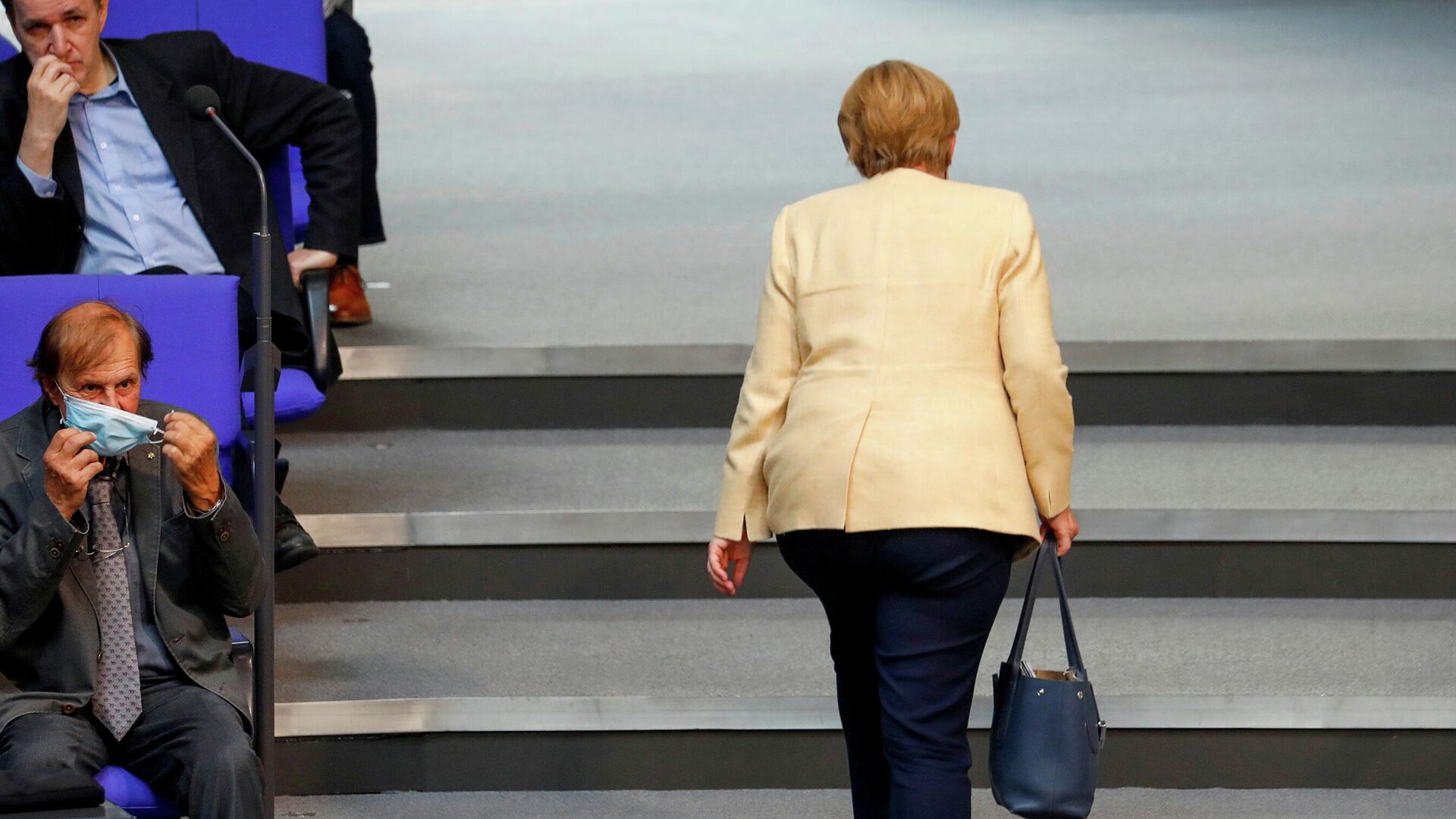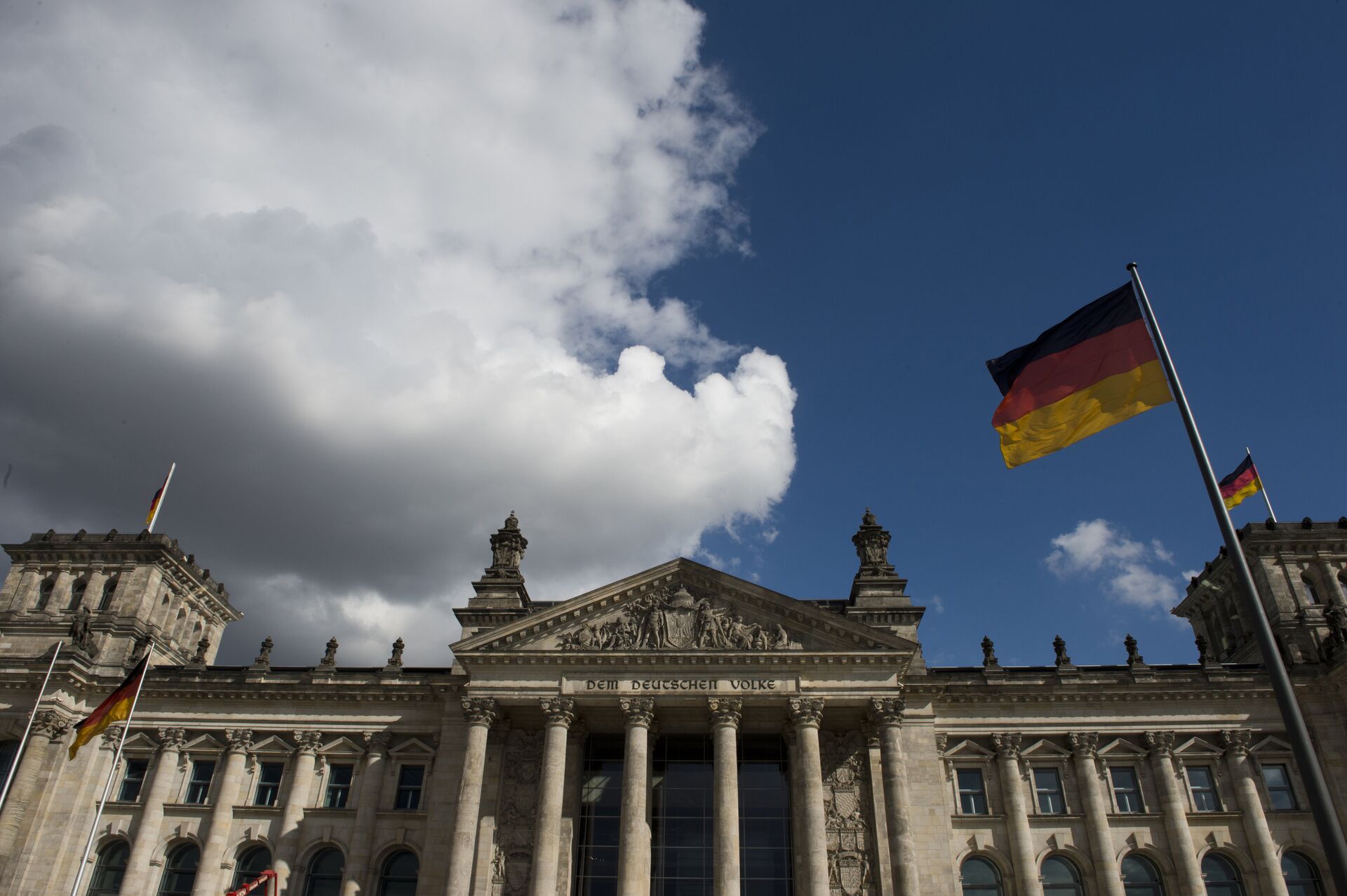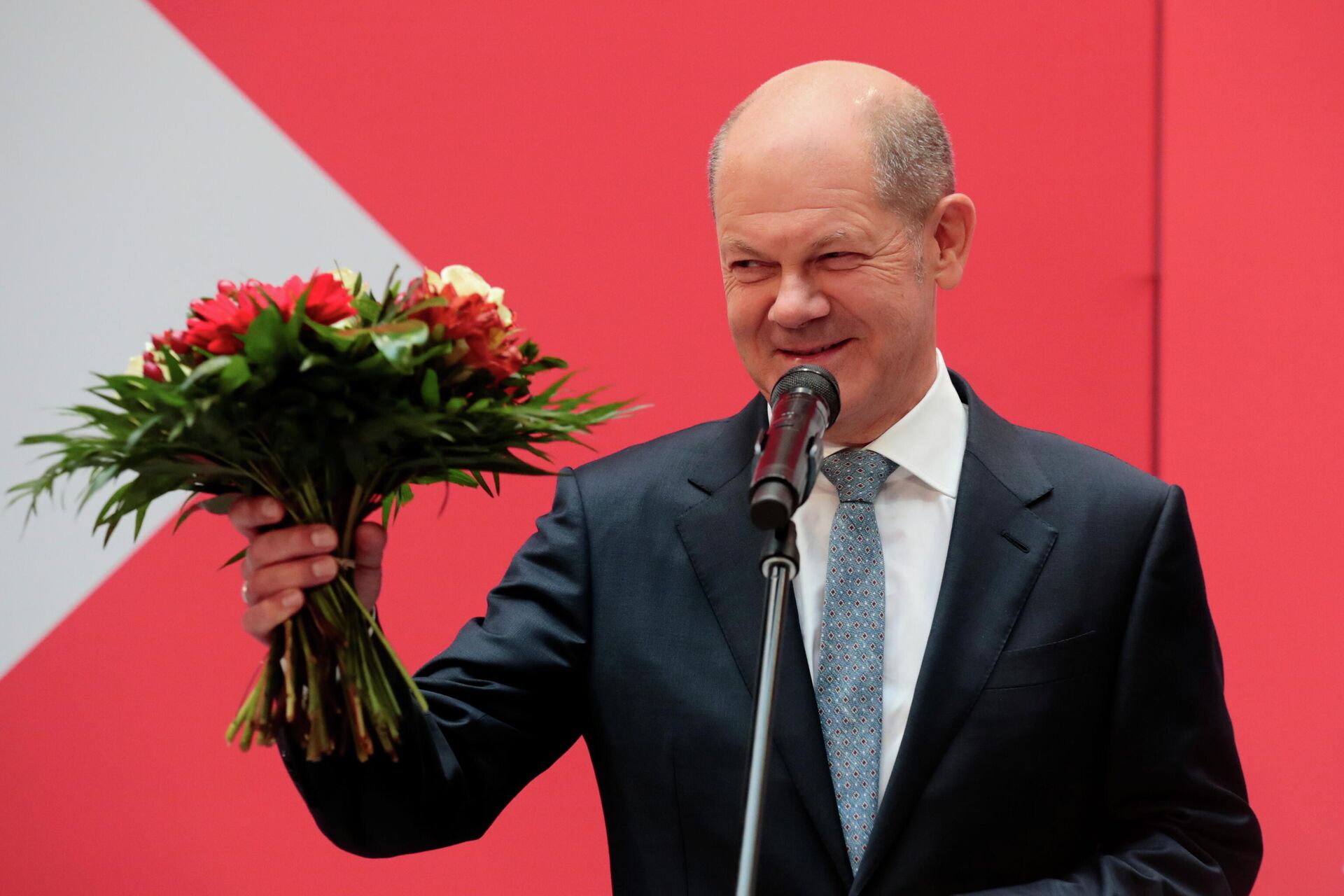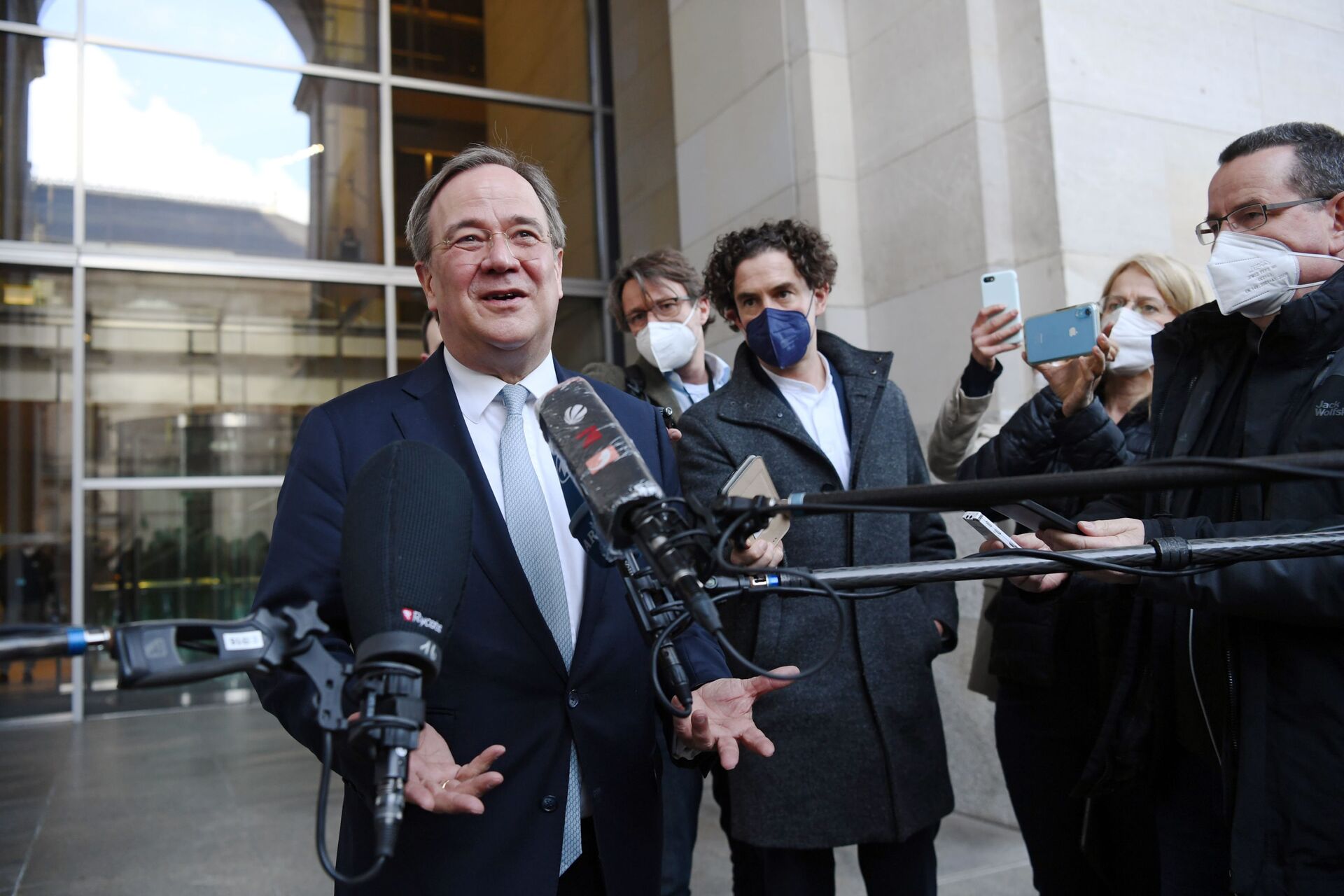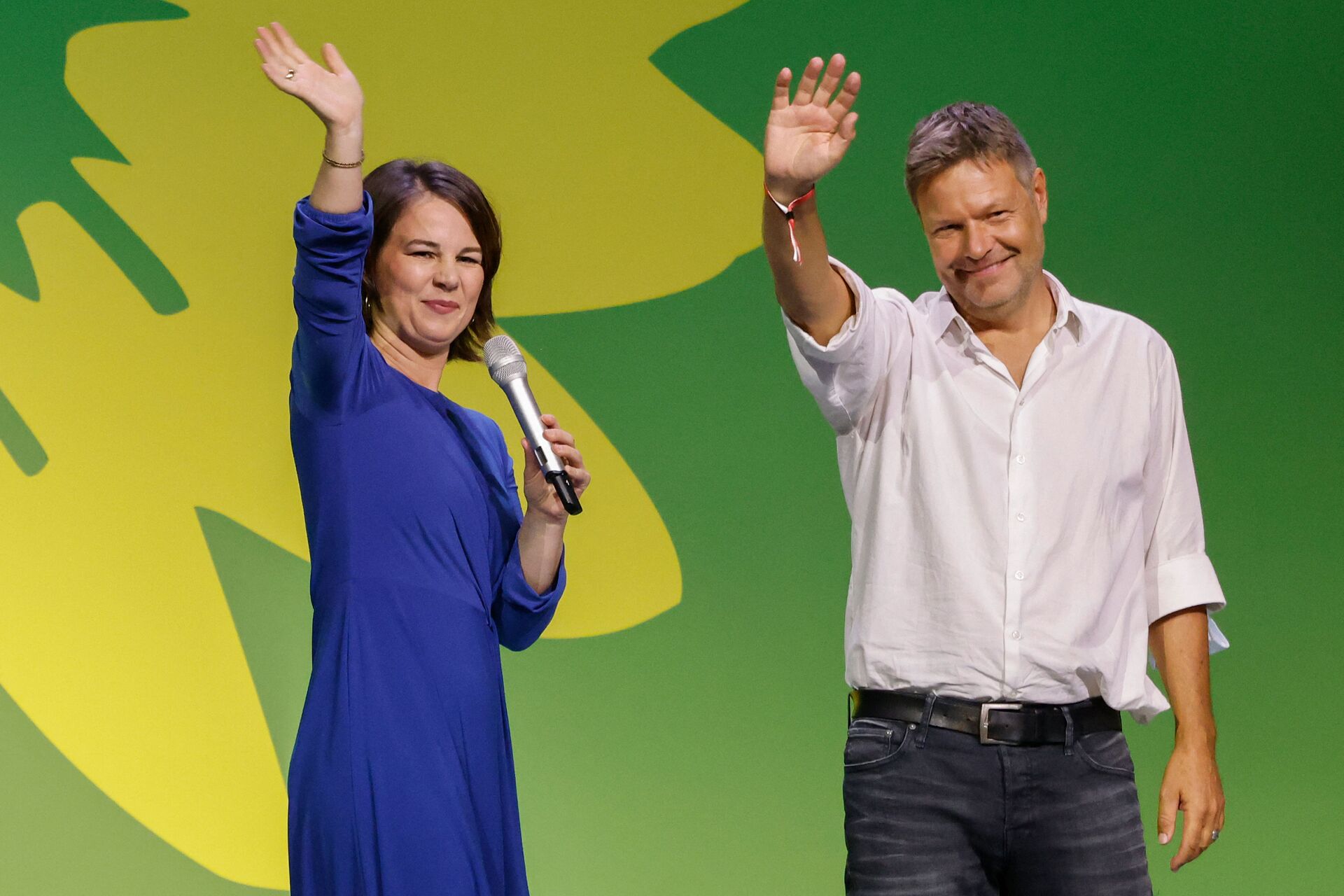https://sputnikglobe.com/20210927/who-are-the-candidates-to-take-over-as-german-chancellor-from-angela-merkel-1089442003.html
Who Are the Candidates to Take Over as German Chancellor From Angela Merkel?
Who Are the Candidates to Take Over as German Chancellor From Angela Merkel?
Sputnik International
Germany’s voting base of 62 million headed to the polls on Sunday to vote in a federal election that will result in a new chancellor taking over from Angela... 27.09.2021, Sputnik International
2021-09-27T10:48+0000
2021-09-27T10:48+0000
2021-09-27T10:48+0000
the greens
spd
germany
angela merkel
christian democratic union/christian social union (cdu/csu)
armin laschet
social democratic party of germany (spd)
cdu
olaf scholz
https://cdn1.img.sputnikglobe.com/img/07e5/09/1a/1089429093_0:0:2690:1514_1920x0_80_0_0_d9a5dea0e80d1ab913a550592b44de38.jpg
Germany's Social Democrats (SPD) party won in the nation's federal election on Sunday after what has been described as a "neck and neck" race. The SPD gained 25.7% of the votes, while the conservative Christian Democratic Union/Christian Social Union bloc witnessed a historic loss, coming in second, garnering approximately 24.1% of votes, according to results released by the electoral commission early on Monday. The Greens, who briefly spurted ahead in the polls, came in third with 14.8%. The Free Democratic Party, with 11.5% of the votes, and the Alternative for Germany Party, with 10.3%, rounded out the top five. Ahead of the elections, each of the leading parties chose their candidate to replace Angela Merkel after her 16-year stint at the helm. However, since World War II, no party in the country has ever won enough seats to form a government on their own, and they've been forced to seek out coalition partners. The candidate for the party with the most seats in the Bundestag, the legislative branch of the German political system, tries to form a coalition to build a majority. Sometimes, it may take weeks or months to form the coalition, with the previous chancellor remaining in the position in a caretaker capacity. After an agreement is hammered out on a coalition, it is voted on and ratified by the individual parties. It is only then that Germany's president officially puts forward a candidate for chancellor, and a simple majority vote is then required from parliament to either give its approval or not. Potential candidates to replace Merkel are her long-time ally and successor in the Christian Democratic Union/Christian Social Union (CDU/CSU) bloc, Armin Laschet; Olaf Scholz, leader of the SPD; and the leader of the German Greens, Annalena Baerbock. Olaf Scholz At his party's headquarters in Berlin, SPD’s Olaf Scholz declared on Monday that he has the mandate to form a new German government with the Greens and Free Democratic Party. According to Scholz, the Social Democrats, Liberals (FDP) and Greens should all be a part of a new German government. The 63-year-old is a lawyer by background, called to the bar in 1985 as specialising in labour and employment law. The politician became a member of the SPD in the 1970s and was a member of the Bundestag from 1998 to 2011. He was mayor of Hamburg from 2011 to 2018, then took over as Deputy Leader of the Social Democratic Party from 2009 to 2019. Scholz was elected as General Secretary of the SPD in 2002, serving alongside Chancellor Gerhard Schröder. He then proceeded to become his party's Chief Whip in the Bundestag, In 2007 he entered the first government of Angela Merkel in 2007 as Minister of Labour and Social Affairs. After the SPD exited the Government in the wake of the 2009 election, Scholz led the SPD in Hamburg. After his party’s victory in the 2011 elections, Scholz became First Mayor of Hamburg until 2018. In the fourth Merkel Government in 2018, Scholz was appointed to serve as both Minister of Finance and Vice Chancellor of Germany. On 10 August 2020, the SPD party executive nominated Scholz to be the party's candidate for Chancellor of Germany at the 2021 federal election. Armin LaschetArmin Laschet, Governor of Germany's most populous state of North Rhine-Westphalia since 2017, is a candidate from Angela Merkel's party – the Christian Democratic Union (CDU) - to succeed her as chancellor. A champion of multiculturalism, Laschet supported Angela Merkel amid the backlash over her migrant policies that resulted in the 2015 refugee influx in Germany. The 60-year-old is the son of a coalminer in Aachen, in western Germany, near the border with Belgium and the Netherlands.Laschet was raised in a Roman Catholic family of German-speaking Walloon origin, has a law degree and worked as a journalist before venturing into politics. In 1994 he was elected to the German Bundestag, becoming a Member of the European Parliament in 1999. In 2012 he became leader of the state party in North Rhine-Westphalia, and was elected Prime Minister of the state in 2017. Laschet was elected leader of the CDU on 16 January 2021, after he scored 52.8% of delegates votes against rival Friedrich Merz in the second round of the contest. He has since positioned himself as the natural heir to the chancellorship. On 20 April 2021 Armin Laschet was confirmed as the CDU/CSU candidate for Chancellor of Germany, However, his campaign has been gaffe-prone. Thus, during destructive flooding this summer in North Rhine-Westphalia, Lascher was caught on camera laughing during a solemn ceremony for the victims. He has also been widely criticised over his COVID-19 pandemic response in the region, with the Sueddeutsche Zeitung newspaper slamming him as "indecisive, sometimes acting impulsively". The politician had earlier indicated that all was not lost yet, after Germany's Social Democrats were announced to have scored a narrow win in the nation's federal election on Sunday, vowing he would "do everything we can to build a government led by the (conservative) Union". Annalena BaerbockIn her youth, co-leader of the Green Party, Annalena Baerbock, was a competitive trampolinist. Now the 40-year old political scientist and international law expert is The Greens' candidate for chancellor and the youngest person ever to run for the position in Germany. Baerbock, a married mother of two, began her political career in Brandenburg. In 2018 she was elected co-leader of the Green Party with Robert Habeck. Baerbock has been urging the country to tackle decarbonizing the automobile sector; transitioning to renewable energy sources, while phasing out use of; and reappraising trade relationships with China and Russia. The politician has been plagued by scandal, ranging from reports that she paid tax on Christmas bonuses years later, to plagiarism allegations regarding her book, "Now: How We Renew Our Country". Critics suggested excerpts in the tome resembled some newspaper stories.
germany
Sputnik International
feedback@sputniknews.com
+74956456601
MIA „Rossiya Segodnya“
2021
News
en_EN
Sputnik International
feedback@sputniknews.com
+74956456601
MIA „Rossiya Segodnya“
Sputnik International
feedback@sputniknews.com
+74956456601
MIA „Rossiya Segodnya“
the greens, spd, germany, angela merkel, christian democratic union/christian social union (cdu/csu), armin laschet, social democratic party of germany (spd), cdu, olaf scholz
the greens, spd, germany, angela merkel, christian democratic union/christian social union (cdu/csu), armin laschet, social democratic party of germany (spd), cdu, olaf scholz
Who Are the Candidates to Take Over as German Chancellor From Angela Merkel?
Germany’s voting base of 62 million headed to the polls on Sunday to vote in a federal election that will result in a new chancellor taking over from Angela Merkel once it becomes clear who her successor will be.
Germany's Social Democrats (SPD) party
won in the nation's federal election on Sunday after what has been described as a "neck and neck" race. The SPD gained 25.7% of the votes, while the conservative Christian Democratic Union/Christian Social Union bloc witnessed a historic loss, coming in second, garnering approximately 24.1% of votes, according to results released by the electoral commission early on Monday.
The Greens, who briefly spurted ahead in
the polls, came in third with 14.8%. The Free Democratic Party, with 11.5% of the votes, and the Alternative for Germany Party, with 10.3%, rounded out the top five.
Ahead of the elections, each of the leading parties chose their candidate to replace Angela Merkel after her 16-year stint at the helm. However, since World War II, no party in the country has ever won enough seats to form a government on their own, and they've been forced to seek out coalition partners.
The candidate for the party with the most seats in the Bundestag, the legislative branch of the German political system, tries to form a coalition to build a majority. Sometimes, it may take weeks or months to form the coalition, with the previous chancellor remaining in the position in a caretaker capacity. After an agreement is hammered out on a coalition, it is voted on and ratified by the individual parties. It is only then that Germany's president officially puts forward a candidate for chancellor, and a simple majority vote is then required from parliament to either give its approval or not.
Potential candidates to replace Merkel are her long-time ally and successor in the Christian Democratic Union/Christian Social Union (CDU/CSU) bloc, Armin Laschet; Olaf Scholz, leader of the SPD; and the leader of the German Greens, Annalena Baerbock.
At his party's headquarters in Berlin, SPD’s
Olaf Scholz declared on Monday that he has the mandate to form a new German government with the Greens and Free Democratic Party.
According to Scholz, the Social Democrats, Liberals (FDP) and Greens should all be a part of a new German government.
"Three parties gained strength [following the elections]: the SPD, the Greens and the FDP. This is a clear request formulated by the citizens of this country. These three parties must lead the next government," underscored the candidate for chancellor.
The 63-year-old is a lawyer by background, called to the bar in 1985 as specialising in labour and employment law. The politician became a member of the SPD in the 1970s and was a member of the Bundestag from 1998 to 2011. He was mayor of Hamburg from 2011 to 2018, then took over as Deputy Leader of the Social Democratic Party from 2009 to 2019. Scholz was elected as General Secretary of the SPD in 2002, serving alongside Chancellor Gerhard Schröder.
He then proceeded to become his party's Chief Whip in the Bundestag, In 2007 he entered the first government of Angela Merkel in 2007 as Minister of Labour and Social Affairs. After the SPD exited the Government in the wake of the 2009 election, Scholz led the SPD in Hamburg. After his party’s victory in the 2011 elections, Scholz became First Mayor of Hamburg until 2018. In the fourth Merkel Government in 2018, Scholz was appointed to serve as both Minister of Finance and Vice Chancellor of Germany.
On 10 August 2020, the SPD party executive nominated Scholz to be the party's candidate for Chancellor of Germany at the 2021 federal election.
Armin Laschet, Governor of Germany's most populous state of North Rhine-Westphalia since 2017, is a candidate from Angela Merkel's party – the Christian Democratic Union (CDU) - to succeed her as chancellor. A champion of multiculturalism, Laschet supported Angela Merkel amid the backlash over her migrant policies that resulted in the 2015 refugee influx in Germany. The 60-year-old is the son of a coalminer in Aachen, in western Germany, near the border with Belgium and the Netherlands.
Laschet was raised in a Roman Catholic family of German-speaking Walloon origin, has a law degree and worked as a journalist before venturing into politics. In 1994 he was elected to the German Bundestag, becoming a Member of the European Parliament in 1999. In 2012 he became leader of the state party in North Rhine-Westphalia, and was elected Prime Minister of the state in 2017. Laschet was elected leader of the CDU on 16 January 2021, after he scored 52.8% of delegates votes against rival Friedrich Merz in the second round of the contest. He has since positioned himself as the natural heir to the chancellorship.
On 20 April 2021 Armin Laschet was confirmed as the CDU/CSU candidate for Chancellor of Germany, However, his campaign has been gaffe-prone. Thus, during destructive flooding this summer in North Rhine-Westphalia, Lascher was caught on camera laughing during a solemn ceremony for the victims. He has also been widely criticised over his COVID-19 pandemic response in the region, with the Sueddeutsche Zeitung newspaper slamming him as "indecisive, sometimes acting impulsively".
The politician had earlier indicated that all was not lost yet, after Germany's Social Democrats were announced to have scored a narrow win in the nation's federal election on Sunday, vowing he would "do everything we can to build a government led by the (conservative) Union".
In her youth, co-leader of the
Green Party, Annalena Baerbock, was a competitive trampolinist. Now the 40-year old political scientist and international law expert is The Greens' candidate for chancellor and the youngest person ever to run for the position in Germany.
Baerbock, a married mother of two, began her political career in Brandenburg.
In 2018 she was elected co-leader of the Green Party with Robert Habeck. Baerbock has been urging the country to tackle decarbonizing the automobile sector; transitioning to renewable energy sources, while phasing out use of; and reappraising trade relationships with China and Russia.
“This election is not just about what happens in the next four years, it’s about our future,” Baerbock, who has never held a ministerial or government position, announced to supporters in Bochum in summer.
The politician has been plagued by scandal, ranging from reports that she paid tax on Christmas bonuses years later, to plagiarism allegations regarding her book, "Now: How We Renew Our Country". Critics suggested excerpts in the tome resembled some newspaper stories.
